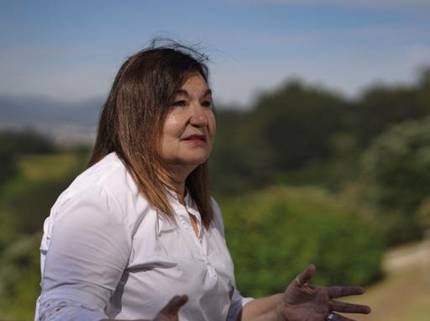“I miss the drastic measures to address the antibiotic crisis.”
In contrast to the uproar generated by COVID-19 in 2020, the antibiotic crisis comes quietly and slowly. But it has the full capacity to compromise the foundations of medicine. Bacterial infections with resistance to all antibiotics are increasingly common, and scientists are distressed. Lucía Gallego Andrés is director of the Laboratory of Antibiotics and Molecular Bacteriology at the Faculty of Medicine and Nursing of the UPV/EHU, where she is clear: “Governments do not provide the resources that the emergency of antibiotics requires.”

We're investigating antibiotic resistance. Especially in hospitals. We investigate the most critical bacteria in the world: [Acinetobacter baumannii]. It is a bacterium that grows in hospitals and constantly causes pneumonia, urinary infections and surgical wound infections. They survive easily in the environment and are found in patient beds and hospital surfaces. Populations resistant to almost all existing antibiotics are appearing more and more frequently.
We are talking about a problem that has been caused by the abuse of antibiotics. It’s not a local problem, but a global one. The Mediterranean and southern European countries are, for example, a hot spot for resistance. Today, 33,000 deaths occur every year in Europe, because previously curable infections are now resistant to antibiotics.
In addition to these deaths, another major problem will arise: they will cause disability problems in many people. They will not die, but their quality of life will be significantly reduced. Infections can lead to amputation of a body part, or harsh treatments that cause indirect damage... We need to start talking about the reduction that we will see in the quality of life and life expectancy.
But the problem goes further. Without antibiotics, the medicine we know today cannot exist. Any surgery—any process that requires the smallest incision—requires antibiotic prophylaxis. Without it, the surgery itself will be dangerous, as it will be a great source of infection. Chemotherapy can also become impossible. It weakens the defenses, and patients can get infections very easily. They will die from acquired infections.
The World Bank has already declared resistance a factor for poverty. In Europe, an additional annual expenditure of 1.5 billion euros will be generated to combat resistant diseases. But in countries like India, an antibiotic against resistant bacteria is much more expensive than here. Therefore, many countries will not be able to cope with the extra expenditure. The World Bank says the resistance will create more poverty and inequality.
That's what it is. Here too, human health is closely linked to animal and environmental health. Antibiotics are widely used in intensive farms, where the growth of stacked and closed animals leads to the continuous formation of infections. Radical changes are needed in intensive livestock systems to ensure the welfare of livestock. Same in fish farms.
In some areas, they are also used for faster animal growth. It is illegal, but there is no strict control. And all these antibiotics then reach the environment through fertilizer that is dumped on the ground from animal waste. They come from the land to the rivers, from the rivers to the sea... and they come back to us.
Oh, yeah, yeah. The antibiotics used end up in the wastewater. And this creates resistant bacteria in the rivers themselves. They're dangerous polluters. Not just in the rivers, we find them in the food, in the environment
In some countries there is an antibiotic-free meat label that is gaining a lot of strength. Citizens, through what we buy, have a great capacity to influence. But I don't think we make enough use of it.
What comes first is that we have been aware of this problem for many, too many years. But no significant and global progress has been made. I miss global policies and truly rigorous measures. We can't go on like this.
Strict hygiene policies must be implemented in hospitals, which are the main source of infection. Health care workers often do not wash their hands when moving from one patient to another. And they go from one place to another with the same clothes, even to the cafeteria. We would avoid 80% of infections that occur in hospitals by changing this.
But some health workers underestimate the problem they are creating and loosen up the measures to prevent infections. Look at how important hand hygiene is: WHO studies have shown that in countries where there is no drinking water, washing the hands of the population is more effective than chlorinating the water itself to prevent infections of the digestive system.
On the other hand, it is still common for the family doctor to administer a broad-spectrum antibiotic without sending the sample to the laboratory and without identifying the species of the bacterium and its resistance profile. In order to avoid this work, broad-spectrum antibiotics are provided, and bacteria are easily made resistant to these. They only send the sample to the laboratory when the treatment fails repeatedly. And it's becoming more and more common to fail, of course. The problem with this habit is growing. The sample should be sent to the laboratory. we can have the result in 24 hours.
But in recent years, the laboratories of health centers and hospitals have been eliminated to centralize everything and make it cheaper economically. There is also a political problem here. The centralization of the infrastructures of the health system limits its efficiency at the health level.
Antibiotics are natural substances produced by bacteria and fungi to compete with other bacterial populations. They are secreted when they are looking for a habitat to live in to get the place. Subsequently, synthetic and semi-synthetic antibiotics have been developed. In reality, antibiotics disrupt the processes that bacteria rely on for life, such as the formation of the outer wall, DNA, and proteins. Being the basic processes for the life of bacteria, they die.
It is important to understand that bacteria do not live individually. They live in communities and must be understood as such. They also come into contact as a community with the other communities of our body: the microbiota of the intestines, the skin and the mucous membranes, among others.
The resistances may be natural or acquired. A random mutation in a bacterium may prevent antibiotics from blocking the formation of the cell wall of that bacterium or one of these basic processes. For example, by getting an enzyme that can break the antibiotic itself, or by changing the metabolic pathway that was inhibited by the antibiotic, or by directly developing an antibiotic elimination pump.
In this way, the gene that has given it the ability to resist will be transmitted by the bacterium to its descendants, like all living beings. But, in this strong community nature of bacteria, you can also pass it on to any member. It can come into contact with each other and pass horizontal transfer through mobile genetic structures called plasmids. It is this collaboration between bacteria that manages to spread the resistances so easily. The source of our problems.
In my opinion, new antibiotics need to be designed, but it is more necessary to think about new ways of combating bacterial infections. For example, cutting off the pathways through which bacteria communicate with each other. In fact, the bacteria only manage to cause infections in the group.
They generate chemical signals to communicate with each other. Initially, a very small number of bacteria enter the body, but they must have a large population of bacteria to overcome our immune system. The same if they want to make a place in our microbiota. So, at first, to prevent the immune system from perceiving them and attacking them, they try to “remain silent.” They are there, dividing and dividing without giving great signals; creating these molecules that only their members know. And, thanks to these molecules, when they see that there is a strong population to cause infection, they all attack together. The concentration of these molecules is the signal used to initiate the attack. “Now, now!” Therefore, interrupting this communication may be a way to control infections.
Bacteriophages are viruses that, instead of infecting us, infect the bacteria themselves. This is a good idea, but it has the difficulty that we should get bacteriophages that only infect resistant bacteria. Otherwise, they will kill the beneficial bacteria that compete with resistant bacteria. And also our microbiota.
On the other hand, when a bacteriophage infects a bacterium, it integrates its genetic information between the genes of the bacterium. Then, when he wants to create new viruses, he reassembles his genes. But, in this process, it can also carry the bacterial resistance genes with it and lead to new populations by infecting new bacteria. Therefore, bacteriophages are very fashionable, but much research is still needed.
In any case, the main problem is that the pharmacies do not put any money into researching antibiotics. since 2010, all antibiotic research lines were closed because they were not considered profitable. The only research currently being conducted is at universities and public institutions, and governments do not provide funding commensurate with the urgency of this emergency.
Yes, it is one of our most complex and unknown systems. Good knowledge will be key in the health system. It is essential to fight infections, fight cancer... but it also has a direct relationship with the nervous system and neurotransmitters of the brain, the intestinal microbiota and the hormonal system. It creates a balance in the body that is essential for all processes to work well and for us to have health. Almost every health problem we can imagine usually happens because the immune system has failed.
Well, perhaps the most significant thing that has been clarified is that the immune system is different in men and women. Immune cells have different receptors on their surface and do not respond in the same way to externally introduced agents. And because of this, we suffer from different infections and diseases in general. In addition, chromosomal endowments are different in women and men: XX and XY. And most genes related to the immune response are on the X chromosome.
I have heard many times that women have a stronger immune system and are more resistant to infections. But it's not true. A stronger response is not always beneficial, as it leads to more autoimmune reactions. In the immune system, balance is the most important thing. If the power is too high, it can be uncontrolled. We have seen it with COVID-19: the complications that have been present have been due to an uncontrolled inflammatory immunological hyperreaction. A very powerful and uncontrolled response that causes damage.
But the immune system also changes throughout life. Men experience more inflammatory or inflammatory processes until puberty, from the intrauterine period. From puberty and throughout adulthood, women have more inflammatory processes. In old age, men again. During these phases, B and T lymphocytes do not function in the same way. These phases of the immune system have a lot to do with hormones, the nervous system, the microbiota, and genetic endowment.
Well, to incorporate what we have learned from the pandemic into the routine practice of medicine: treatments must be adapted to men and women, and in clinical trials, yes or yes, enough women must be included. Without an excuse. Because it is necessary to speak clearly: in this matter, there is a strong denial, in a large part of health workers and researchers.
Buletina
Bidali zure helbide elektronikoa eta jaso asteroko buletina zure sarrera-ontzian











